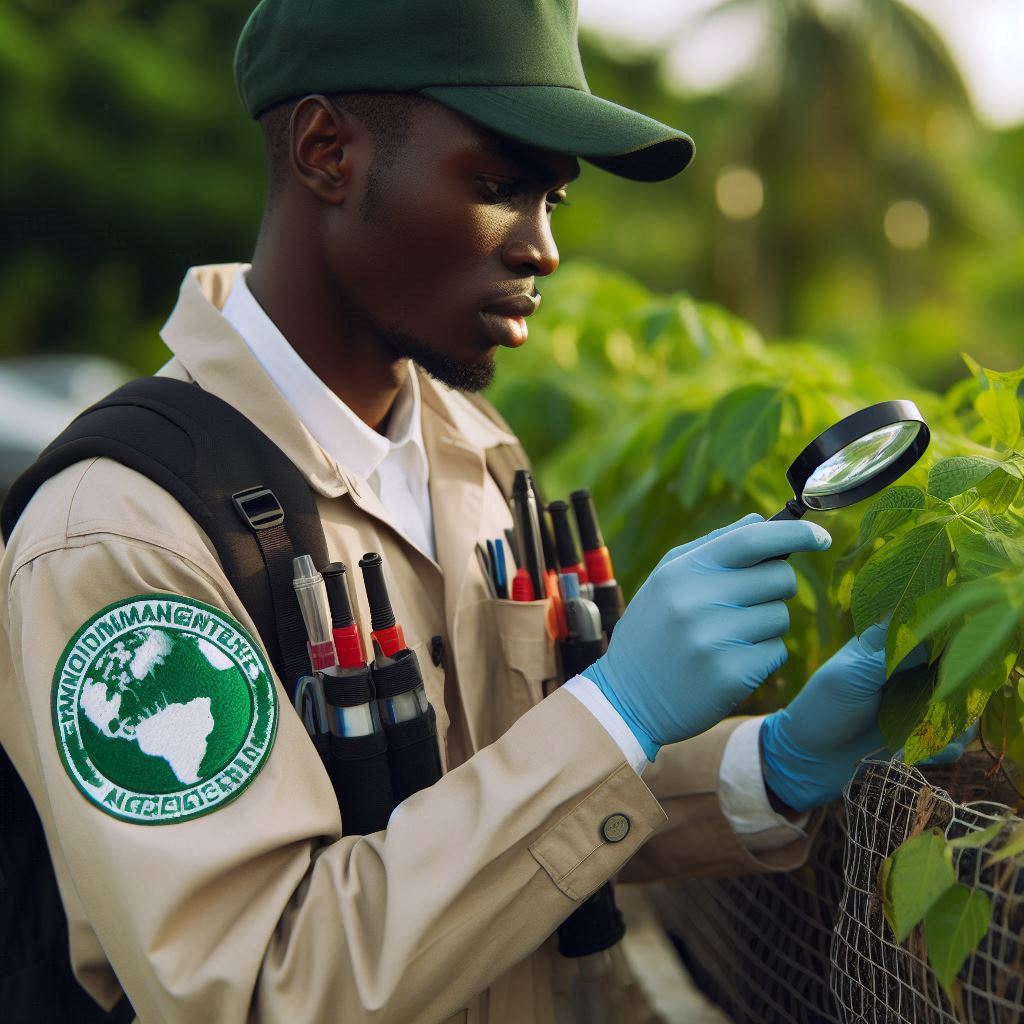Introduction
Environmental management involves overseeing natural resources and human activities to protect the environment.
It encompasses practices that aim to reduce pollution, conserve biodiversity, and ensure sustainable use of resources.
In Nigeria, environmental management is crucial for sustainable development and public health.
The country’s diverse ecosystems, from rainforests to savannas, require careful management to maintain ecological balance.
Effective environmental management addresses numerous challenges.
It tackles pollution from industrial and urban sources, combats deforestation, and mitigates climate change impacts.
Proper management ensures the preservation of biodiversity and natural habitats, vital for the country’s ecological health.
This practice enhances the quality of life for Nigerians by providing cleaner air, water, and land. The importance of environmental management in Nigeria cannot be overstated.
Nigeria faces significant environmental issues that threaten its natural resources and the well-being of its citizens. Addressing these issues is essential for the country’s economic growth and sustainable development.
Proper environmental management supports agricultural productivity, which is crucial for food security.
It also helps prevent natural disasters like floods and erosion, protecting communities and infrastructure.
Overview of Environmental Issues in Nigeria
Major Environmental Challenges
Nigeria faces several significant environmental challenges that threaten its natural resources and the well-being of its population. One of the most pressing issues is deforestation.
Nigeria loses approximately 350,000 hectares of forest annually. This alarming rate of deforestation leads to habitat loss and decreased biodiversity. It also exacerbates soil erosion and desertification, particularly in northern regions.
Pollution is another critical environmental challenge in Nigeria. Major cities like Lagos and Port Harcourt suffer from severe air pollution.
Industrial emissions, vehicle exhaust, and open burning contribute to hazardous air quality. Water pollution is equally concerning. Many rivers and lakes are contaminated with industrial waste, sewage, and oil spills.
The Niger Delta region, in particular, is heavily polluted due to oil extraction activities. This pollution devastates aquatic ecosystems and contaminates drinking water sources.
Climate change impacts Nigeria significantly. Rising temperatures and changing rainfall patterns affect agricultural productivity. The country experiences more frequent and intense droughts and floods.
These extreme weather events damage crops, reduce food security, and displace communities. Coastal erosion, driven by rising sea levels, threatens coastal communities and infrastructure.
Severity of Environmental Issues
Statistics and examples illustrate the severity of Nigeria’s environmental issues. The Food and Agriculture Organization (FAO) reports that Nigeria has one of the highest deforestation rates globally.
Forest cover has declined from 17% in 1990 to less than 8% in 2020. This drastic reduction in forest area highlights the urgent need for sustainable forest management.
Air pollution levels in Lagos are alarming. The World Health Organization (WHO) states that air quality in Lagos frequently exceeds safe limits.
Residents are exposed to harmful pollutants like particulate matter and nitrogen dioxide. This exposure leads to respiratory problems and other health issues.
Water pollution in the Niger Delta is severe. Oil spills have destroyed vast areas of mangrove forests and contaminated water sources.
A United Nations Environment Programme (UNEP) report estimates it will take 30 years to clean up the region. The environmental degradation has had catastrophic effects on local communities and wildlife.
Impact on Livelihoods
These environmental issues profoundly impact the livelihoods of Nigerians. Deforestation affects rural communities that rely on forests for their livelihoods.
Many people depend on forests for fuelwood, food, and medicinal plants. Deforestation disrupts these resources and contributes to poverty.
Pollution poses serious health risks to Nigerians. Air pollution causes respiratory illnesses, cardiovascular diseases, and premature deaths.
Water pollution results in waterborne diseases like cholera and typhoid fever. Contaminated water sources force communities to rely on unsafe water, affecting their health and well-being.
Climate change threatens food security and agriculture. Erratic rainfall and extreme weather events reduce crop yields. Farmers face challenges in predicting planting seasons and managing water resources.
Coastal erosion displaces communities and destroys homes and farmland. These impacts increase vulnerability and reduce the resilience of affected populations.
Government Policies and Regulations
Role of the Nigerian Government in Environmental Management
The Nigerian government plays a crucial role in environmental management. Its policies and regulations shape the framework for environmental protection.
Government actions aim to ensure sustainable development and address pressing environmental issues like pollution, deforestation, and biodiversity loss.
The Federal Ministry of Environment leads Nigeria’s environmental efforts, formulating policies and enforcing regulations. These measures are designed to promote sustainable practices across various sectors.
Key Policies, Laws, and Regulations that Govern Environmental Protection in Nigeria
Key policies and regulations are fundamental to Nigeria’s environmental protection framework. The National Policy on the Environment guides sustainable practices, emphasizing pollution control, waste management, and resource conservation.
The Environmental Impact Assessment (EIA) Act is another critical regulation, requiring assessments before major projects begin.
EIAs help identify potential environmental impacts and ensure that development projects consider environmental sustainability.
The National Forestry Policy focuses on forest conservation and sustainable management, addressing deforestation and promoting reforestation.
The National Oil Spill Detection and Response Agency (NOSDRA) Act governs oil spill management. NOSDRA monitors and responds to oil spills, ensuring swift action and prevention measures.
The National Environmental Standards and Regulations Enforcement Agency (NESREA) Act empowers NESREA to monitor compliance with environmental laws and regulate activities that may harm the environment.
These policies and laws form the backbone of Nigeria’s environmental management efforts.
Effectiveness of These Policies in Addressing Environmental Issues
Despite comprehensive policies, the effectiveness of Nigeria’s environmental regulations varies. Enforcement is often inconsistent, with corruption and inadequate resources hindering regulatory agencies.
These issues weaken the impact of environmental policies, making it challenging to achieve desired outcomes. However, efforts to improve enforcement and resource allocation continue.
The Nigerian government recognizes the need for stronger environmental governance. Recent initiatives, like the Green Bonds initiative, fund sustainable projects such as renewable energy, reforestation, and waste management.
This initiative demonstrates a commitment to environmental sustainability. International cooperation also enhances Nigeria’s environmental policies.
Participation in global agreements like the Paris Agreement aligns Nigeria with international standards, bringing technical and financial support through international partnerships.
Evaluating the effectiveness of policies reveals both successes and areas for improvement.
While regulations have increased awareness and led to some positive changes, stronger implementation of existing laws is essential. Public participation is critical for effective environmental management.
Communities must engage in policy development and enforcement, ensuring that all stakeholders are involved. Government transparency and accountability are necessary to improve outcomes.
Read: Role of Fisheries in Nigerian Food Security
Role of Non-Governmental Organizations (NGOs)
Involvement of NGOs in Environmental Management Initiatives
Non-Governmental Organizations (NGOs) play a crucial role in environmental management in Nigeria. They actively engage in various initiatives to protect and preserve the environment.
NGOs often collaborate with local communities, government agencies, and international bodies. Their involvement ranges from advocacy and policy influence to on-the-ground conservation efforts.
By leveraging their expertise and resources, NGOs address critical environmental issues effectively.
Contributions of NGOs in Raising Awareness and Promoting Sustainable Practices
NGOs significantly contribute to raising awareness about environmental issues in Nigeria. They organize educational campaigns to inform the public about the importance of environmental conservation.
These campaigns highlight the impacts of deforestation, pollution, and climate change. By using media, workshops, and community meetings, NGOs spread crucial information.
This awareness helps foster a culture of environmental responsibility among Nigerians.
NGOs also promote sustainable practices through various programs. They provide training and resources to encourage eco-friendly farming techniques.
By introducing sustainable agriculture practices, NGOs help reduce deforestation and soil degradation.
They also advocate for the adoption of renewable energy sources, such as solar and wind power. These initiatives reduce reliance on fossil fuels and decrease environmental pollution.
Examples of Successful Projects or Campaigns Carried Out by NGOs
One notable example of successful NGO involvement is the Nigerian Conservation Foundation (NCF). NCF has implemented numerous projects focused on biodiversity conservation and habitat restoration.
Their project in the Hadejia-Nguru Wetlands aims to protect vital wetland ecosystems. By working with local communities, NCF promotes sustainable fishing and agriculture practices. This project has improved livelihoods while preserving critical habitats.
Another successful initiative is the work of the Environmental Rights Action/Friends of the Earth Nigeria (ERA/FoEN).
ERA/FoEN campaigns against environmental degradation caused by oil extraction in the Niger Delta. They raise awareness about the devastating impacts of oil spills and advocate for stricter regulations.
Their efforts have led to increased accountability and remediation efforts by oil companies.
The Heinrich Böll Stiftung Nigeria is another NGO making a significant impact. They focus on climate change mitigation and sustainable urban development.
Their projects in Lagos promote green infrastructure and waste management. By implementing urban farming initiatives and recycling programs, they improve urban sustainability. These projects not only protect the environment but also enhance urban residents’ quality of life.
Read: Environmental Impact Assessments in Fisheries

Sustainable Practices and Technologies
Environmental degradation is a pressing issue in Nigeria, and addressing it requires the adoption of sustainable practices and technologies.
By embracing eco-friendly solutions in sectors such as agriculture, energy, and waste management, Nigeria can mitigate the adverse effects of environmental degradation.
Importance of Adopting Eco-Friendly Solutions
One of the key benefits of incorporating sustainable practices is the preservation of natural resources.
In agriculture, for example, practices such as organic farming and agroforestry help promote soil health and biodiversity, leading to increased crop yields and reduced dependence on chemical inputs.
In the energy sector, transitioning to renewable sources such as solar and wind power can help reduce greenhouse gas emissions and combat climate change.
By investing in clean energy technologies, Nigeria can also strengthen its energy security and create new opportunities for sustainable economic growth.
Effective waste management is another crucial aspect of sustainable development. Implementing recycling programs and promoting waste-to-energy initiatives can help minimize the burden on landfills and reduce environmental pollution.
By adopting circular economy principles, Nigeria can turn waste into a valuable resource and create a more sustainable waste management system.
Case Studies of Successful Implementation
Several organizations and initiatives in Nigeria have successfully implemented sustainable practices to address environmental challenges.
One notable example is the Ogoni Clean-Up Project, which aims to remediate the environmental damage caused by oil pollution in the Niger Delta region.
By utilizing eco-friendly technologies and engaging local communities in the cleanup efforts, the project has made significant progress in restoring the affected ecosystems.
Another success story is the Lufasi Nature Park in Lagos, which serves as a model for sustainable biodiversity conservation.
Through habitat restoration, community engagement, and educational programs, the park has transformed a degraded landscape into a thriving ecosystem that supports local wildlife and promotes environmental awareness.
Furthermore, the Nigerian government has taken steps to promote sustainable development through initiatives such as the National Renewable Energy and Energy Efficiency Policy.
By setting targets for renewable energy deployment and energy efficiency improvements, the policy aims to reduce the country’s carbon footprint and increase access to clean and affordable energy sources.
In review, adopting sustainable practices and technologies is essential for mitigating environmental degradation in Nigeria.
By embracing eco-friendly solutions in various sectors and learning from successful case studies, Nigeria can pave the way for a greener, more sustainable future.
Read: Environmental Biology Conferences and Seminars
Challenges and Limitations
In Nigeria, there are numerous challenges faced in the implementation of effective environmental management strategies.
These challenges range from financial constraints to lack of political will and social factors that hinder progress. Below are some of the key challenges outlined along with potential solutions or recommendations to overcome them.
Financial Constraints
One of the major challenges in environmental management in Nigeria is the lack of adequate funding for sustainable initiatives.
This poses a significant barrier to the implementation of projects aimed at conserving the environment and addressing issues such as pollution and deforestation.
In order to overcome this challenge, it is imperative for the government to allocate more resources towards environmental protection and sustainability.
Additionally, partnerships with private sector organizations and international donors can help fill the gap in funding for environmental projects.
Lack of Political Will
Another critical challenge in Nigeria is the lack of strong political will to enforce environmental laws and regulations effectively.
This often leads to poor enforcement of environmental standards, resulting in widespread pollution and degradation of natural resources.
To address this challenge, there needs to be a concerted effort to hold government officials accountable for their actions and ensure compliance with environmental laws.
Furthermore, public awareness campaigns and advocacy efforts can help garner support from policymakers and the public to prioritize environmental protection.
Social Factors
Social factors such as lack of awareness, cultural practices, and resistance to change also present challenges to environmental management in Nigeria.
For instance, traditional livelihood practices may be harmful to the environment, but communities are reluctant to adopt new sustainable alternatives.
To overcome these social barriers, education and awareness programs should be implemented to inform communities about the importance of environmental conservation.
Engaging with local stakeholders and involving them in decision-making processes can also help address resistance to change and foster a sense of ownership in environmental initiatives.
In essence, while Nigeria faces significant challenges in environmental management, there are opportunities for improvement through strategic interventions.
By addressing financial constraints, lack of political will, and social factors, the country can make progress towards sustainable environmental practices and safeguarding its natural resources for future generations.
Read: Nigerian Fisheries: Best Practices and Innovation
Conclusion
In this blog, we explored various aspects of environmental management in Nigeria. Key points included sustainable practices, policy initiatives, and community involvement.
We examined how Nigeria faces significant environmental challenges such as deforestation, pollution, and loss of biodiversity. The government’s role in implementing effective environmental policies and regulations was also discussed.
Collective action and commitment are crucial for effective environmental conservation. Government bodies, non-governmental organizations, and local communities must collaborate to address environmental issues.
Policies alone cannot achieve sustainability; they need active implementation and public support. Strong enforcement mechanisms are necessary to ensure compliance with environmental laws and regulations.
Individual responsibility plays a significant role in protecting the environment. Simple actions like reducing waste, conserving water, and using eco-friendly products make a difference.
Educating others about the importance of environmental conservation is equally important. Schools, community groups, and media outlets should promote awareness and encourage sustainable practices.
We must inspire others to join these efforts. Everyone’s participation, no matter how small, contributes to the greater goal of environmental sustainability. Collective efforts can lead to significant positive changes.
Encouraging responsible behavior and fostering a culture of conservation are essential steps towards a sustainable future.
Transform Your Career with Expert Guidance
Get personalized mentorship consulting that’s tailored to your unique path. Our expert advice is actionable and exclusive.
Get Started



